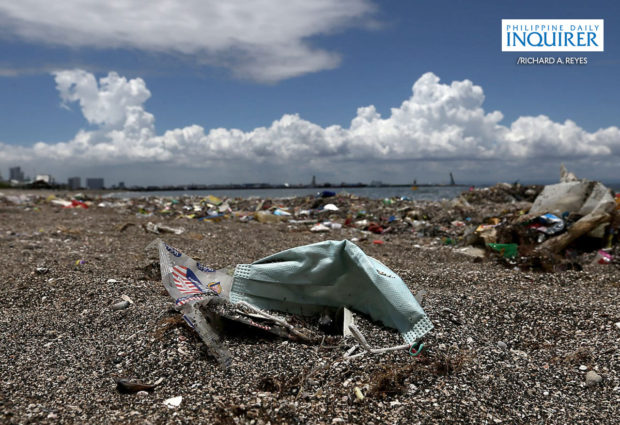
Discarded face masks and other trash are seen along the shore of Baseco Beach in Tondo, Manila on June 4, 2021, some of which were washed ashore by strong waves after Tropical Storm Dante passed near Manila. RICHARD A. REYES / INQUIRER PHOTO
MANILA, Philippines — The improper disposal of face masks and face shields, along with that of other waste materials, is providing the perfect breeding ground for aedes aegypti mosquitoes, which spread viruses that cause dengue and other fever diseases.
In a statement on Monday, environmental health group EcoWaste Coalition said that while acknowledging the need for face masks and face shields at this time of the pandemic, there is need for a sustainable waste management in order to prevent the outbreak of dengue and other diseases, and lessen the burden on the health sector.
“By ecologically managing our discards, we prevent the collection of water in snack packs, plastic containers, tin cans, broken appliances, used tires, and even in used face masks where dengue transmitting Aedes aegypti mosquitoes can lay their eggs,” Jove Benosa, Zero Waste Campaigner from EcoWaste Coalition, said.
The group likewise urged the public to give all-out support to ecological solid waste management at the household level and in the community to lessen the dengue cases amid the pandemic.
The Department of Health has proposed a four-step strategy, called 4-S, in fighting dengue — (1) search and destroy mosquito-breeding sites, (2) secure self-protection measures, (3) seek early medical consultation, and (4) support fogging/spraying only in hotspot areas.
“Preventing and controlling dengue outbreaks is very important as the country’s healthcare system is already facing tremendous pressure due to the COVID-19 pandemic. We need to avoid dengue and other rainy season diseases from further stretching the system’s capacity to serve our people’s health needs,” Benosa said.
The zero-waste advocacy group urged the public to observe 12-point eco-tips:
– Properly manage household discards, keeping non-biodegradables dry and clean.
– Inspect and remove standing water at home, in your garden and neighborhood.
– Turn over, store in a dry place or dispose of containers that may collect water.
– Cover water drums, pails and tanks with lids or mosquito-proof mesh.
– Empty and clean water containers thoroughly once a week.
– Change water in flower vases weekly.
– Remove water from pot plates every other day.
– Clean plant pots that may harbor mosquitoes.
– Loosen soil in potted plants to prevent water from stagnating on the surface
– Clean animal drinking containers daily.
– Cut or puncture tires used as roof support to avoid collecting water.
– Clean clogged roof gutters of leaves and other debris.
The group also encouraged the public to avoid unregistered household insecticides, including mosquito repellent products, which may pose health and environmental risks.
The Department of Environment and Natural Resources recently called on local government units to pass ordinances that would direct barangays (villages) in implementing waste segregation. — Faith Yuen Wei Ragasa, Inquirer trainee